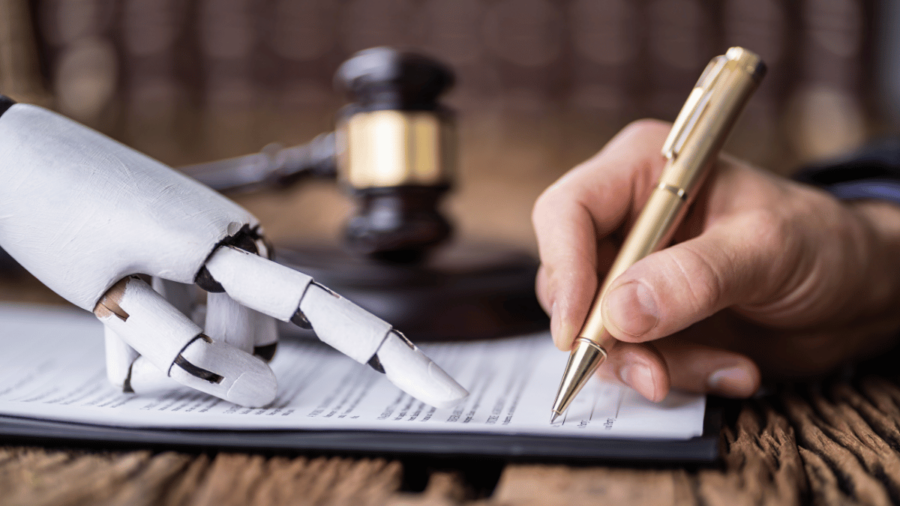
DoNotPay, a ‘robot lawyer’ chatbot, started out in 2015 as an easy way to challenge parking tickets, but founder Joshua Browder’s ambition has grown since then. He quickly moved the app on to automating legal matters that range from reversing bank fees to bankruptcy filings and job discrimination complaints using artificial intelligence.
Its backers argue that taking expensive human experts out of the process makes the legal system more accessible. “I’m trying to remove the word ‘lawyer’ from the dictionary,” Browder has said, claiming that much of the time they are “charging hundreds or thousands of dollars for copying and pasting a few documents”.
Shockingly, real, human lawyers are not best pleased. DoNotPay is facing a spate of legal challenges that could be a blueprint for AI sceptics in other industries. The latest accuses DoNotPay of practising law without a licence. US law firm Edelson filed a class action suit against the company last week on behalf of one of its customers. In the suit, it claims that “DoNotPay is not actually a robot, a lawyer, nor a law firm. DoNotPay does not have a law degree, is not barred in any jurisdiction, and is not supervised by any lawyer.”
This is not the first time the issue of whether the bot constitutes an illegal practice of law has been raised. In December, DoNotPay was forced to U-turn on a proposal to use AI chatbot ChatGPT to make arguments in a physical courtroom (via AirPods hooked up to the defendant).
Browder said in a tweet that he had received threats of six months’ jail time from public prosecutors if he followed through with the plans. He later announced DoNotPay would retreat from legal work that did not focus on consumer rights matters, such as disputing credit reports or medical bills.
More AI lawsuits are on the horizon
The controversy around DoNotPay is just the latest legal skirmish for the booming AI sector. Developers’ boundless ambitions to disrupt entire industries through automation are starting to slam into the very human edifice of the legal system.
The claims could represent a watershed moment for artificial systems’ encroachment on work formerly done by humans
Getty Images is suing the Stable Diffusion image generation app for allegedly breaching its copyright by using images from its photo library to train the AI. A number of artists are also taking action against the platform (and two of its rivals) for remixing their work without approval. Other AI platforms owned by OpenAI, Microsoft and Github are facing similar intellectual property claims.
Experts say the outcome of these cases is hard to predict as they represent complex new territory for US and EU copyright law. DoNotPay’s future is similarly murky.
But the cases could represent a watershed moment for artificial systems’ encroachment on work formerly done by humans. Many AI companies have long argued that their products will work alongside humans, helping them to work faster and smarter. That increasingly sounds like a questionable claim.
As computer systems start to take on high-status work that humans enjoy – not just repetitive drudgery – we can expect to see more arguments that we should judge and control them by human standards, too.
Licensed professionals from accountants to engineers could take up claims against AI innovations seeking to disrupt their income streams in a similar way to DoNotPay, for instance. AI technology used to screen job candidates might come under fire from discrimination legislation, while text generators whose output is used for fraud could be held liable for the resulting crimes.
While most lawsuits to date have been in the US, the UK will not be immune. A government policy paper published last autumn set out an intention to develop “pro-innovation, light-touch” regulation for AI – potentially creating legal ambiguities that will be contested in the courtroom.
What’s clear is that in the battle over the future of work, humans are not going down without a fight.

DoNotPay, a ‘robot lawyer’ chatbot, started out in 2015 as an easy way to challenge parking tickets, but founder Joshua Browder’s ambition has grown since then. He quickly moved the app on to automating legal matters that range from reversing bank fees to bankruptcy filings and job discrimination complaints using artificial intelligence.
Its backers argue that taking expensive human experts out of the process makes the legal system more accessible. “I'm trying to remove the word ‘lawyer’ from the dictionary," Browder has said, claiming that much of the time they are “charging hundreds or thousands of dollars for copying and pasting a few documents”.
Shockingly, real, human lawyers are not best pleased. DoNotPay is facing a spate of legal challenges that could be a blueprint for AI sceptics in other industries. The latest accuses DoNotPay of practising law without a licence. US law firm Edelson filed a class action suit against the company last week on behalf of one of its customers. In the suit, it claims that “DoNotPay is not actually a robot, a lawyer, nor a law firm. DoNotPay does not have a law degree, is not barred in any jurisdiction, and is not supervised by any lawyer."
